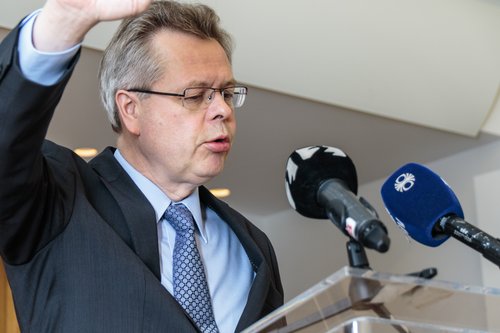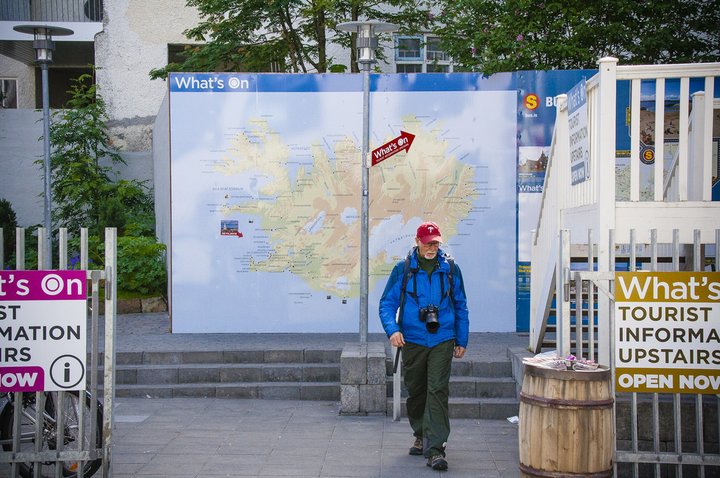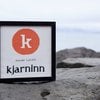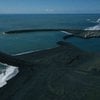Capital controls on Icelandic people, firms, and pension funds were lifted on Tuesday (14 March).
The removal of the capital controls was announced on Sunday, in addition to updates to rules on foreign exchange and special reserve requirements for new foreign currency inflows.
The capital restrictions were introduced in the wake of Iceland's financial collapse eight years ago.
In early October 2008, the Icelandic banking system, which had grown to be twelve times the GDP of Iceland, came crumbling down in a matter of three days. With that crash came a completely new reality for Icelanders.
The Icelandic Krona lost almost half of its value, inflation soared, unemployment rose to double-digit figures, emergency laws were put in place, and the Treasury, which had been almost debt-free, faced a 216 billion krona deficit - amounting to 12 percent of its GDP.
The country needed to enter an IMF-programme to get access to funds and maintain a sense of normality.
On 28 November 2008, capital controls were put in place to stop the outflow of Krona-assets from the Icelandic economy, to protect the currency, address problems in the balance of payments and temper shocks to the Icelandic economy.
In practice, the controls meant that the freedom to transfer funds to and from Iceland was taken away.
The free movement of capital, secured in the EEA-agreement with the EU, was de-facto abolished. Nobody could get foreign currency without going through the Central Bank of Iceland.
Regular people had to bring their plane ticket with them to purchase euros in a bank if they were travelling to the continent, in order to prove that they were really leaving the country. All exporters were compelled by law to hand in all foreign currency revenues to the Central Bank.
Offshore owners of Krona were stuck inside the capital controls until further notice.
Tourism saves the day
Since 2011, Iceland has experienced a remarkable change in fortune.
The country has experienced growth every year since then and this hit record highs in 2016 at a whopping 7.2 percent.
Of the countries that are a part of OECD, only India had a higher level of growth.
The reason for this was a tourist boom in Iceland. In 2010, around 500,000 people visited the island. This year it is expected that the number of tourists will hit 2.3 million, in a country with around 330,000 inhabitants.
 In the last few years the government has also reached an agreement with the creditors of the failed banks and a number of large offshore Krona-owners. This left the Icelandic economy with a sizeable haircut taken from creditors' assets to maintain stability.
In the last few years the government has also reached an agreement with the creditors of the failed banks and a number of large offshore Krona-owners. This left the Icelandic economy with a sizeable haircut taken from creditors' assets to maintain stability.
Last August, measures were taken to lift the capital controls in gradual steps and, on Sunday, the government announced that they will be mostly abolished them.
“Iceland's careful, measured approach to lifting capital controls was developed and approved with domestic and international support," said finance minister Benedikt Johannesson in a press conference.
"As a result of this structured plan, our diversified economy is larger than ever before and expected to continue to grow at a robust pace this year. Our sustainable fisheries, tourism, tech start-ups and renewable energy sectors have grown rapidly, providing a strong backbone to our economy. This move is the critical first step in the new government's strategy for the country's financial future, and we can now look ahead with a healthier, stronger and more diversified economy,” he added.
The offshore krona problem
One of the largest problems that needed resolving before the capital controls could be fully lifted was the fact that foreign investors still owned a large amount of offshore Krona assets, 195 billion Krona (currently €1.65 billion) to be exact.
These investors have wanted to get out of Iceland for years, but have not been able to do so due to the controls. A deal was needed to reduce the effect of their exit on the value of the Icelandic Krona.
The Central Bank of Iceland concluded an agreement with some of the owners of offshore Krona assets in the last weeks.
Under the agreement, the bank will purchase offshore Krona assets from them in an amount equivalent to around 90 billion Krona, at an exchange rate of 137.5 krona per euro, up to 20 percent higher than the official exchange rate.
Offshore Krona holders that have not made an agreement with the Bank will be invited to do so in the next two weeks. Some of them have however declined the offer already.
According to the Bank’s assessment, offshore krona assets amounted to approximately 200 billion Krona at the end of February 2017. After the transactions announced the outstanding stock of offshore krona, assets will total about 100 billion Krona.
The transactions will stave off the risk of large-scale outflows of offshore Krona through the foreign exchange market, upon the liberalisation of capital controls, according to the Central Bank.
Therefore, they reduce the systemic risk associated with a large stock of offshore Krona assets, which, in the Bank’s opinion, could have caused monetary, exchange rate, and financial instability.
Positive reactions
The lifting of capital controls has already had an effect on Iceland´s ratings. Standard & Poor´s (S&P) raised Republic of Iceland Ratings to 'A/A-1 yesterday. Outlook is stable. S&P say: “We believe that the recent lifting of most of the remaining capital controls and the conclusion of an agreement with the owners of offshore krona assets strengthen Iceland's external profile. We are therefore raising our long- and short-term ratings on Iceland to 'A/A-1' from 'A-/A-2.“
Moody‘s Investors Service also issued a positive Comment on the Government of Iceland yesterday, without raising Iceland´s credit rating.
The lifting of capital controls has not had extensive effects on the value of the Krona. Before the actions were announced a single Euro cost 115 Krona. After the market closed last Friday one had to pay 116,95 per Euro, so the Krona has lost 1.7 percent og its value during the week.
Despite of the above mention actions the Central Bank decides to keep its key interest rates at five percent siting continued high growth as the main reason. A statement from the Monetary Policy Committee stated: “Indicators imply continued strong growth thus far in 2017. Job creation is strong, unemployment is low, and the labour participation rate has risen above the pre-crisis peak. Even though importation of foreign labour pulls in the opposite direction, demand pressures in the economy are growing.“
A limited version of the article, and without latest updates, was published in EU Observer last week.









